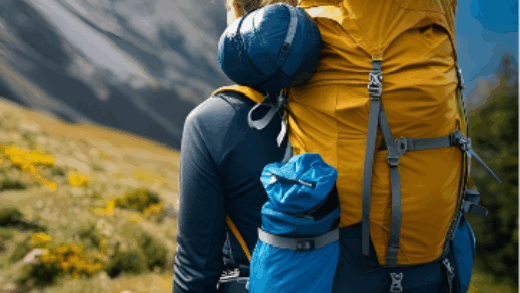In today’s fast-paced, technology-driven world, many people are searching for ways to disconnect from the daily grind and reconnect with themselves, nature, and others. One of the most accessible and rewarding ways to achieve this is through hiking. Whether it’s a short trail through a local park or a multi-day adventure in the mountains, hiking offers a unique blend of physical, mental, and emotional benefits. In this article, we’ll explore the many advantages of hiking and why more people are embracing it as a regular part of their lifestyle.
1. Physical Health Benefits
Cardiovascular Fitness
Hiking is an excellent form of aerobic exercise. When you walk on trails—especially those with inclines—you get your heart pumping, which improves cardiovascular health. Regular hiking can help lower blood pressure, reduce the risk of heart disease, and improve overall circulation.
Muscle Strength and Endurance
Unlike walking on flat pavement, hiking often involves uneven terrain, inclines, and obstacles like rocks and roots. This variability engages different muscle groups, particularly in the legs, core, and even upper body if you’re using trekking poles. Over time, this strengthens muscles and builds endurance.
Weight Management
Depending on the trail difficulty and your pace, hiking can burn anywhere from 400 to 700 calories per hour. As a result, it’s an effective way to manage weight and improve overall body composition when combined with a balanced diet.
Improved Balance and Coordination
Navigating uneven ground forces your body to make constant adjustments, enhancing your sense of balance and coordination. This is particularly beneficial as we age, helping to reduce the risk of falls and related injuries.
Bone Density and Joint Health
Weight-bearing exercises like hiking promote bone density, helping to prevent osteoporosis. Additionally, the movement keeps joints lubricated and flexible, which is crucial for long-term mobility.
2. Mental Health Benefits
Stress Reduction
One of the most immediate effects of hiking is a reduction in stress. Being surrounded by nature, breathing fresh air, and moving your body all contribute to a significant decrease in cortisol levels, the hormone responsible for stress.
Improved Mood and Mental Clarity
Exposure to natural light and greenery has been shown to boost serotonin levels, leading to a better mood and increased feelings of happiness. The rhythmic motion of walking also has a meditative quality, which can help clear the mind and improve focus.
Reduced Symptoms of Depression and Anxiety
Multiple studies suggest that spending time in nature and engaging in physical activity can significantly reduce symptoms of depression and anxiety. In fact, “eco-therapy” or nature-based therapy is becoming more widely recommended by mental health professionals.
Boosted Creativity and Problem Solving
Time spent hiking has been linked to increased creativity. Researchers have found that people who disconnect from electronic devices and spend time in natural environments perform better on creative problem-solving tasks.
3. Social Benefits
Strengthened Relationships
Hiking can be a great bonding activity. Whether it’s with family, friends, or a hiking group, sharing the experience of a trail fosters deeper connections. The lack of digital distractions allows for more meaningful conversations and shared memories.
Community and Belonging
Many towns and cities have local hiking clubs or meetups, providing opportunities to connect with like-minded individuals. These communities often organize group hikes, clean-up days, and other events that build a sense of belonging.
Encourages Cooperative Behavior
Group hiking often requires teamwork—whether it’s helping someone over a log, sharing supplies, or navigating a tricky path. These shared challenges build trust and cooperation among participants.
4. Connection with Nature
Environmental Awareness
Regular exposure to nature often leads to a greater appreciation for the environment. Hikers are more likely to support conservation efforts and advocate for the protection of natural spaces.
Mindfulness and Presence
Hiking encourages you to be present. As you take in the sights, sounds, and smells of the natural world, you naturally become more mindful. This heightened awareness can spill over into daily life, improving your overall well-being.
Spiritual Connection
For many people, nature is a place of spiritual reflection. Whether it’s a quiet walk in the woods or a mountaintop sunrise, hiking provides moments of awe and wonder that can foster a deeper connection with the universe or a higher power.
5. Practical Benefits
Low Cost and Accessibility
Unlike many forms of exercise that require a gym membership or expensive equipment, hiking is relatively inexpensive. All you need is a good pair of shoes, comfortable clothes, and perhaps a backpack with water and snacks. Trails are available in nearly every region, from urban parks to national forests.
Suitable for All Ages and Skill Levels
One of the greatest things about hiking is its versatility. There are trails for every fitness level, from easy walks to challenging climbs. It’s an activity that families, seniors, children, and athletes can all enjoy at their own pace.
Promotes Sustainable Travel and Tourism
As more people choose hiking-focused vacations or day trips, it promotes eco-friendly travel. Local economies benefit from tourism that doesn’t rely on heavy infrastructure or large-scale development.
6. How to Get Started with Hiking
If you’re new to hiking, getting started is easy:
- Start small with local trails and short distances.
- Wear the right gear, including sturdy shoes and weather-appropriate clothing.
- Bring essentials like water, snacks, a map, and a fully charged phone.
- Check the weather and trail conditions before you go.
- Leave no trace: Be respectful of nature by packing out all trash and minimizing your impact.
As your fitness and confidence grow, you can gradually take on more challenging hikes and explore new regions.






Comments are closed.